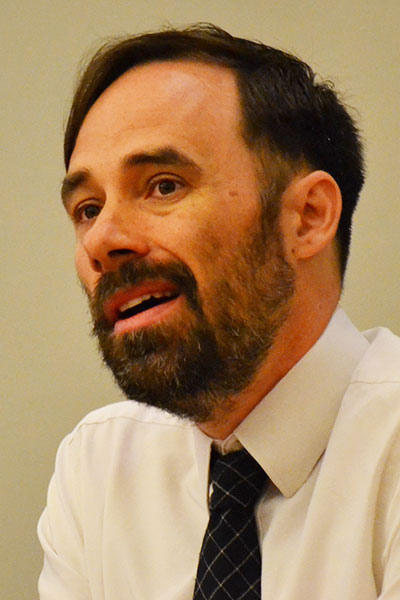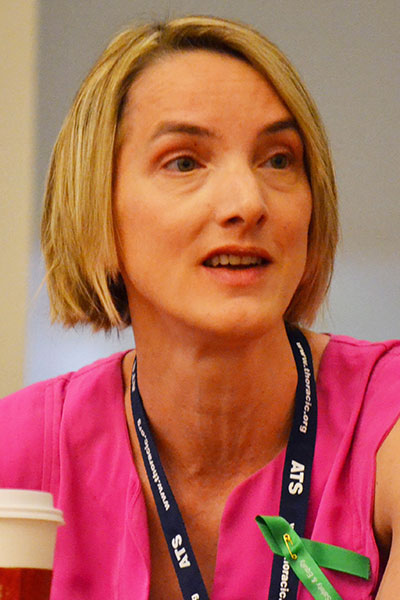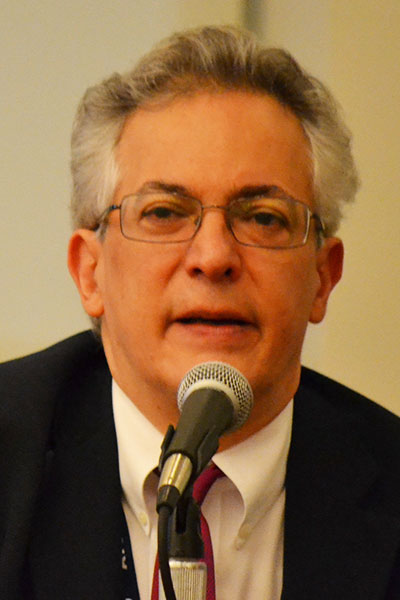A panel of three ATS experts continued the Keynote Series on Monday with a session on climate change that addressed air quality, social justice, and how to take action at a local level. The Air That I Breathe: Climate Change and Health – A Conversation with ATS Experts was moderated by ATS President Gregory P. Downey, MD, ATSF.

Kevin Cromar, PhD, associate professor, Department of Populations Health, NYU Grossman School of Medicine, talked about the social cost of carbon, which is the numerical result of a costs-versus-benefits analysis of any potential government action related to climate. Dr. Cromar described it as the “most important number you’ve never heard of.”
He explained that the ATS re-evaluated how its health impacts were measured by the Environmental Protection Agency, which enabled the Society to generate new estimates for health impacts. The EPA now uses the updated data in economic analyses.
“Health impacts account for over half of the total economic damages when we evaluate policies, which is a much better reflection of where we are,” Dr. Cromar said. “It’s tough when you make a contribution to a number that no one has heard of, but the end result is we will see more effective climate policies that better take into account the health impacts of climate change.”

On the topic of how local and regional institutions can affect change, Mary B. Rice, MD, MPH, director of the Institute of Lung Health, Beth Israel Deaconess Medical Center, pointed out that health care is one of the most energy-intensive sectors of society. Dr. Rice, past chair of the ATS Environmental Policy Committee, encouraged clinicians to seek opportunities to participate on sustainability committees and work with facilities and operations to adopt more sustainable practices, such as using more renewable energy.
While expense is always a deterrent, Dr. Rice said there are programs established to assist with the cost burden, and having doctors advocate for those programs is an added incentive.
Dr. Cromar gave an example of how to become involved, as experts, at the local level: by seeking out the agencies that oversee air quality, transportation planning, and public service commissions, asking those boards at a public meeting to share what they’re doing on climate and local health impact, and using that opportunity to share research and clinical knowledge.
“That approach creates a conversation, and it will work. It will provide opportunities to make a difference on a local level,” Dr. Cromar said.

Juan Carlos Celedón, MD, DrPH, ATSF, professor of medicine, epidemiology, and human genetics at the University of Pittsburgh, discussed how some forms of medication delivery, such as pressurized canisters, contribute to pollution. However, changing the formulation could make medications that are already expensive even more unattainable.
“The problem is cost,” said Dr. Celedón, a past president of the ATS. “In some of these countries, a canister of Albuterol, for example, already costs seven days’ wages.”
He also addressed the concept of social justice and its relation to climate change and pollution, citing that minorities in the U.S. are more likely to live near major roadways and are disproportionately exposed to air traffic pollution.
Dr. Rice emphasized the importance of respiratory health clinicians when considering the social justice aspect.
“We are health care professionals. Our mission is to improve the respiratory health of our patients and the world,” she said. “As professionals, we need to come together and say, ‘smoking tobacco is unhealthy, and so is burning fossil fuels.’ We have the evidence to say that with absolute confidence. So, yes, this is going to be hard, but we need to be courageous, and we need to be consistent. And that has to be the goal.”
Extend Your Learning Beyond San Francisco with ATS 2025 Conference Highlights

With so many valuable educational opportunities offered during the ATS 2025 International Conference, attendees are often forced to decide which sessions to prioritize. That’s why the Society is offering three ATS 2025 Conference Highlights packages for those unable to attend ATS 2025 San Francisco or attendees interested in continuing their education after the conference. Check out the packages and pick the one that’s right for you. Learn at your own pace, whenever and wherever you are!

